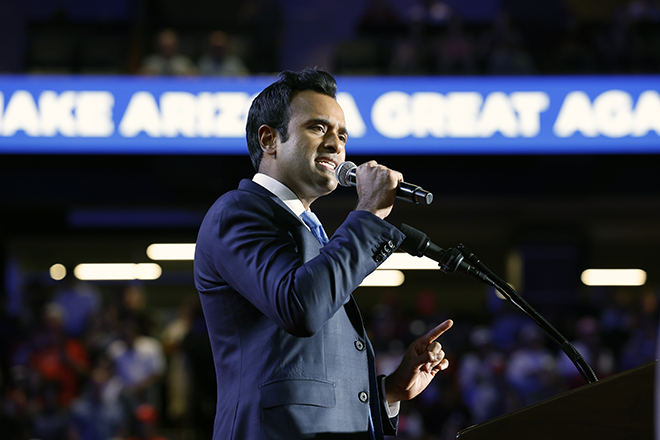S&P Global Offerings
Featured Topics
Featured Products
Events
S&P Global Offerings
Featured Topics
Featured Products
Events
S&P Global Offerings
Featured Topics
Featured Products
Events
Banking & Capital Markets
Economy & Finance
Energy Transition & Sustainability
Technology & Innovation
Podcasts & Newsletters
Banking & Capital Markets
Economy & Finance
Energy Transition & Sustainability
Technology & Innovation
Podcasts & Newsletters
S&P Global Offerings
Featured Topics
Featured Products
Events
18 Nov, 2024
By Karin Rives

| Vivek Ramaswamy, seen here at an August 2024 event in Arizona, was tapped to co-lead President-elect Donald Trump's government efficiency group. Ramaswamy is a vocal critic of ESG investment criteria. |
Thousands of US companies must prepare for reporting mandates in California and Europe, even though the US Securities and Exchange Commission's embattled climate risk disclosure rule is unlikely to survive a Donald Trump presidency.
The incoming Trump administration is also expected to rewrite or amend a 2022 rule that gives retirement plan managers the right to consider environmental, social and governance risks and opportunities in their investment decisions, law firm Ropes & Gray wrote Nov. 6.
Financial and legal experts, however, said investors will continue to look at long-term revenue trends that extend far beyond a four-year presidency.
"Data is power, and every single analyst and portfolio manager out there is looking for anything that will help give them an insight into how to outperform," said Julie Anderson, who led a $55 billion portfolio of sustainable exchange-traded funds for BlackRock Inc. before joining American University's business school faculty in fall of 2023. "If non-financial [ESG] factors have the ability to have a financial impact, they will be traded upon."
Sustainability data will still be used to steer capital, Anderson said during an interview, even though a Republican-led campaign against ESG-related investment criteria or climate disclosures has prompted some companies to dial back their climate engagement.
California disclosure laws
California Gov. Gavin Newsom recently signed into law several updates to two climate disclosure laws on the books since 2023 , leaving intact a start date of Jan. 1, 2026.
By that deadline, companies that do business in California and have at least $1 billion in annual revenue must prepare a report disclosing their direct and indirect emissions — known as Scope 1, 2 and 3 emissions — and have them validated by a third-party organization. The legislation, state Senate Bill 253, applies to an estimated 5,344 companies across the US, according to Senate floor analyses.
Businesses with more than $500 million in annual revenue must also prepare a climate-related financial risk report outlining how extreme weather, supply chain interruptions, new government regulations or other events may affect their revenue stream. They must also show how they are adapting to such risks. There are more than 10,000 such companies, according to Senate floor analyses of S.B. 261.
All businesses covered by the California regulations must submit their reports to a state board and publish them on their websites.
Since the Nov. 5 election, attorneys at Ropes & Gray have fielded dozens of calls from clients asking what to expect from the new administration, said Michael Littenberg, the global head of the law firm's ESG and corporate social responsibility practice.
"Companies are at a very different stages of maturity on their climate reporting and their readiness," Littenberg said in an interview. "There are some clients that don't need to do a lot of incremental work to be ready, and there are clients that have to do more. As a general matter, we are advising companies that they should be preparing for the California climate disclosure laws."
So far, litigation against the California regulations has not been able to halt implementation of the new emissions reporting and climate risk disclosure mandates.
In January 2024, the US Chamber of Commerce and other business groups sued the California Air Resources Board, the state agency charged with implementing the state's climate disclosure laws, to try to halt the mandates. In a temporary victory for the state, a federal district judge on Nov. 5 denied a request by the groups to issue a summary judgment, instead allowing a full trial to go forward to examine the facts in the case.
Global disclosure trends
The European Union already has climate risk disclosure regulations in place, and another 29 jurisdictions are in various stages of implementing such policies, according to a new report by the IFRS Foundation, a nonprofit that develops international sustainability standards for capital markets.
That means US companies with global operations are already well under way with their climate risk reporting programs, said Steven Rothstein, managing director of the Ceres Accelerator for Sustainable Capital Market, a program within the non-partisan Ceres investor advocacy group.
"Those 30 [jurisdictions] represent 55% of the world's GDP," Rothstein said in an interview. "If you're a large company, you're probably in Canada, Brazil and Australia, many other countries that have these in place."
Corporate executives across the board and regardless of their political leanings want consistency in order to plan 5 to 10 to 20 years out, Rothstein said.
Future of ESG acronym
The verdict is still out regarding how ESG will fare as an investment term in coming years. Many Republican-led states already have policies on the books prohibiting the use of ESG considerations for state pensions and other public investments, although such laws have spurred legal challenges from business groups.
"I think the market is still trying to grapple with coming up with a better term," Littenberg said. "It's a politically loaded term, and other terms are being used, but I don't think there's another that has moved into common usage."
In an early sign of where policies might be heading, Trump appointed entrepreneur Vivek Ramaswamy as co-leader of an efficiency group to "dismantle government bureaucracy, slash excess regulations, cut wasteful expenditures, and restructure federal agencies," according to a message the president-elect posted on his Truth Social platform on Nov. 12. Ramaswamy is a vocal critic of ESG investment criteria.
